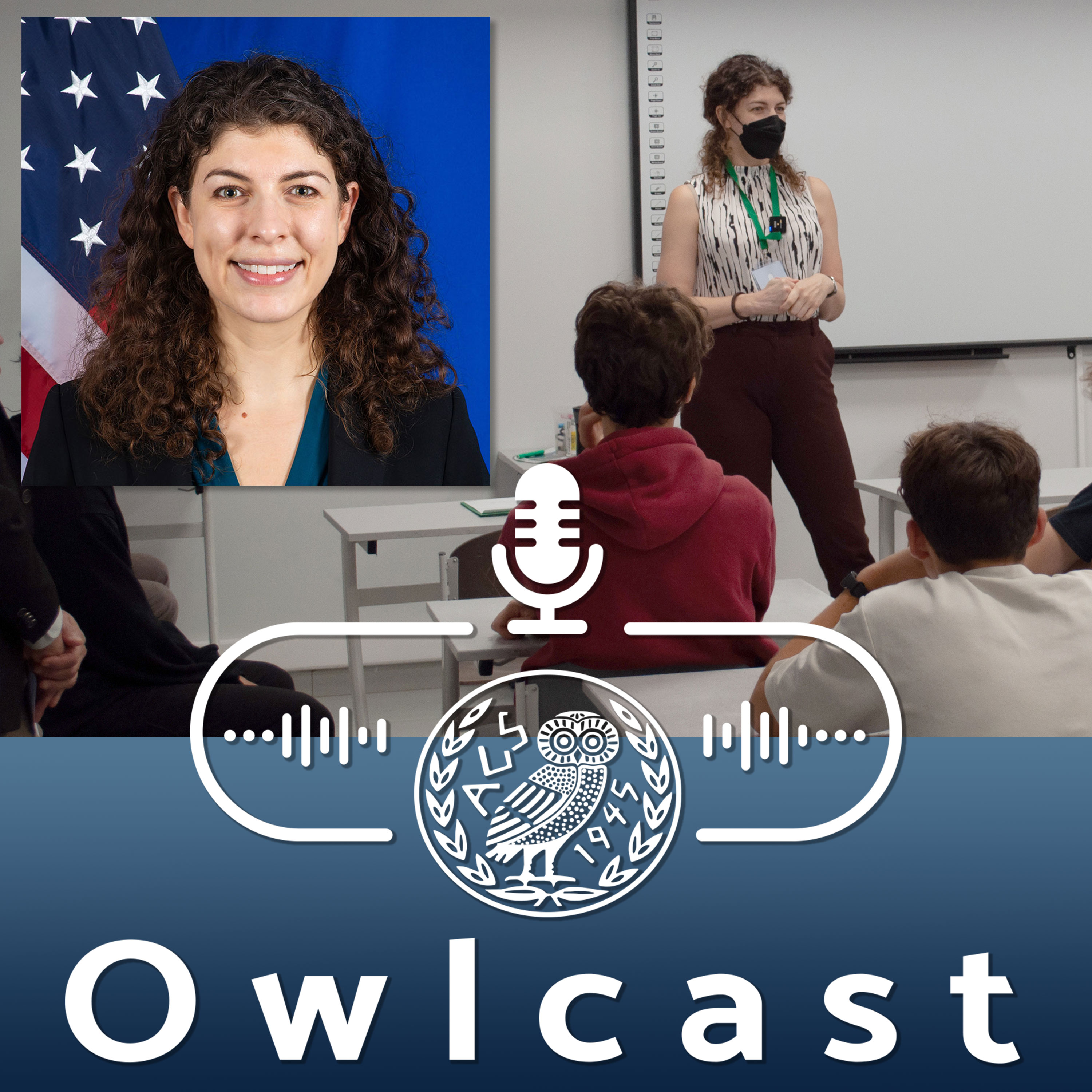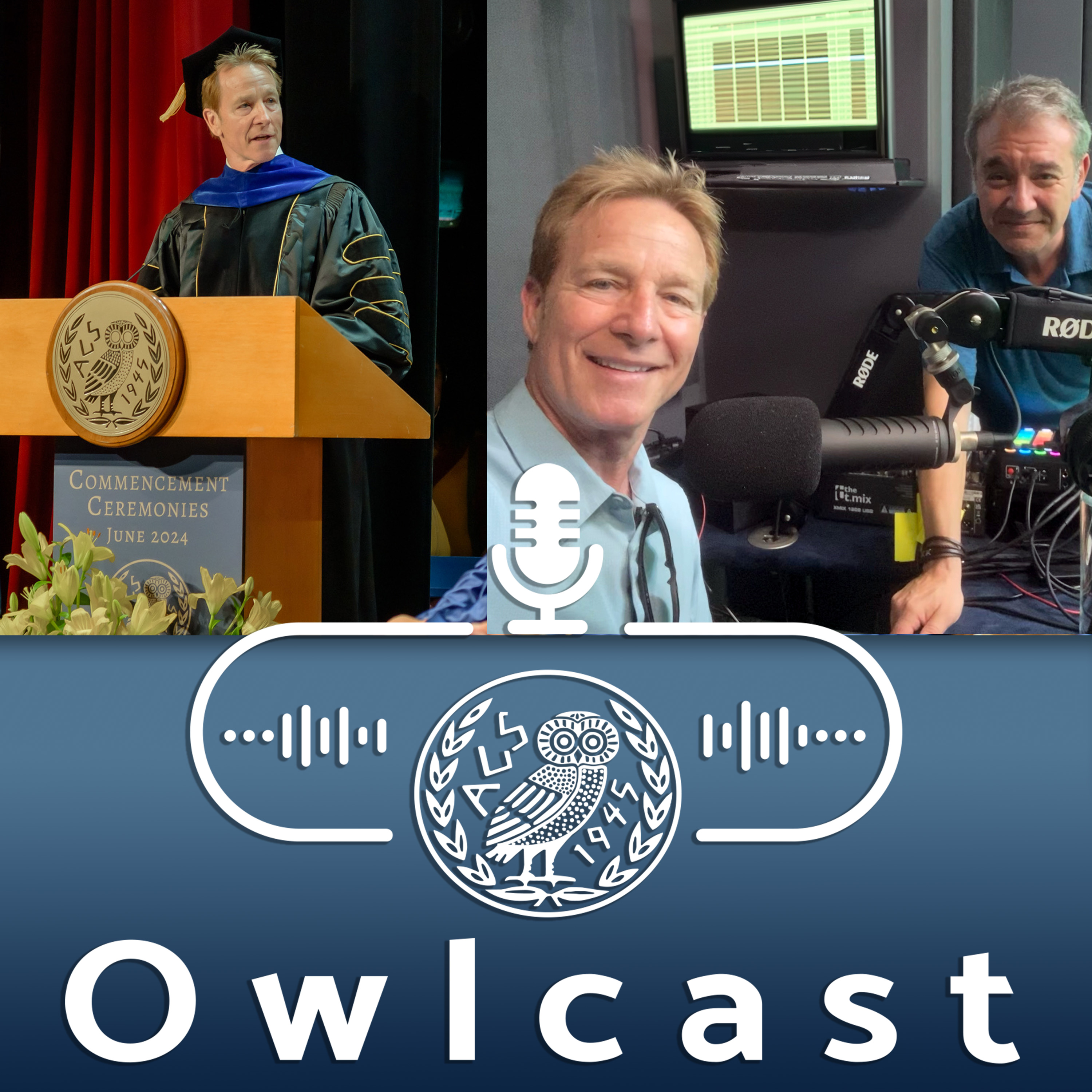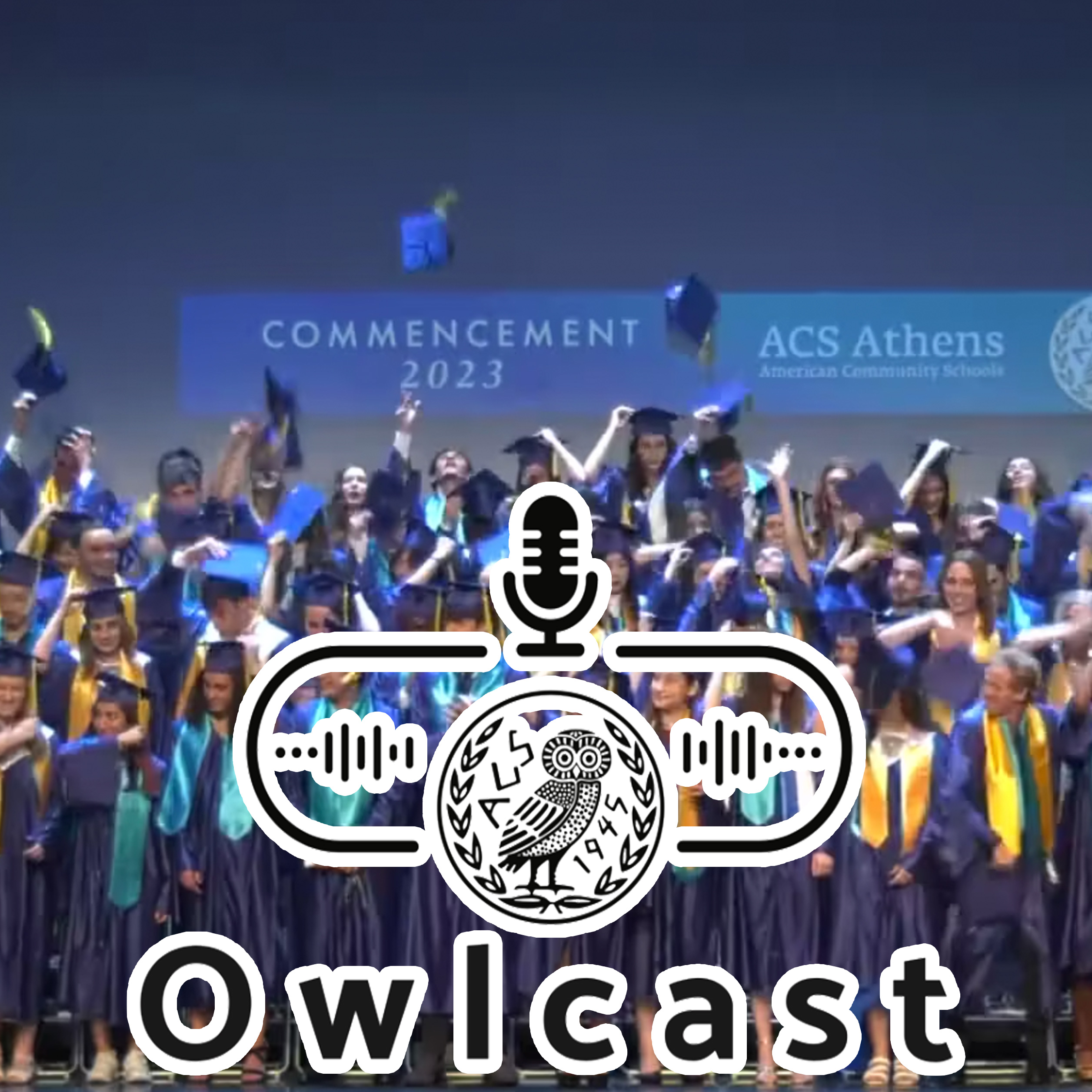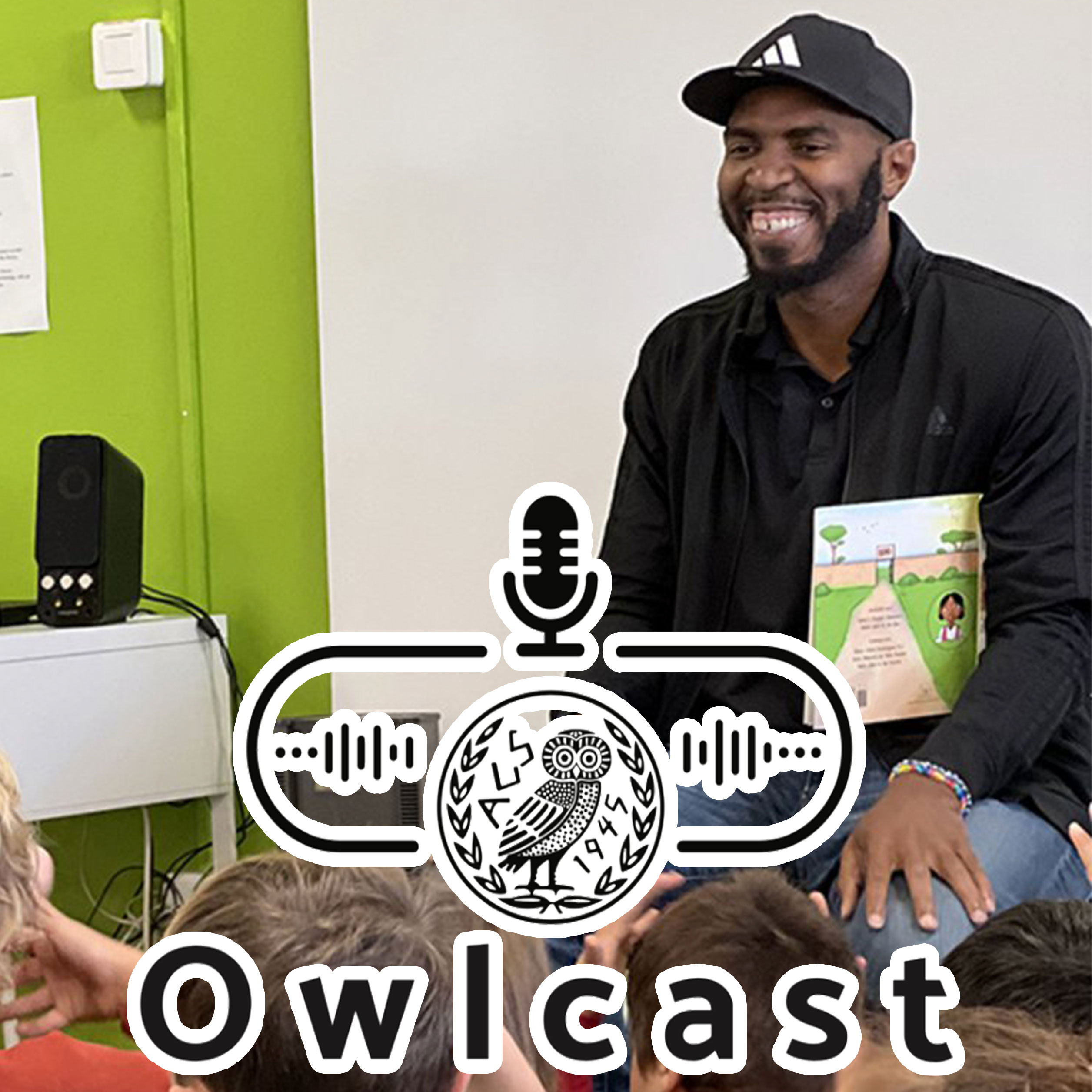Episode Transcript
[00:00:10] Speaker A: This is the owlcast, the official podcast of ACS Athens.
Listen to the exciting story of the American Community Schools of Athens.
Check out what drives all the members of our international community of learners as we create the education of the future.
Here's John Papadakis.
[00:00:48] Speaker B: Low enrollment in science and technology programs is a pressing issue worldwide, largely due to students disinterest and the difficulty they experience in relating science to real life applications.
Some experts believe that this challenge is intensified by less than optimal teaching methodologies that focus more on note memorization than practical engaging learning, causing high dropout rates and discouraging students from continuing in STEM fields. Socioeconomic barriers further exacerbate these issues as students from low income families often cannot afford supplemental education or private tutoring, which are commonly needed to succeed in science courses. Gender, race and socioeconomic status also play a role in deterring students from pursuing STEM education, often due to negative stereotypes and the lack of relatable role models. According to some studies. Addressing these enrollment issues requires a multifaceted approach including improved teaching resources, robust support for science students, and a curriculum that emphasizes critical thinking and problem solving. Furthermore, aligning science curricula with practical career prospects and global market demands can make STEM fields more attractive to students. As our guest today mentions, communicating the stories of scientists as they do groundbreaking work or make fascinating discoveries is invaluable in inspiring young minds. One should also not ignore the modern lifestyle of the youth that is dominated by time spent on social media. It's common knowledge that social media has reshaped how young people see and engage with the world around them. Their interest in STEM fields is being affected by their worldview in a significant way. The instant gratification loop provided by social media, where quick entertainment and rapid feedback dominate, contrasts sharply with the patience and problem solving required in STEM fields. This difference can make the sustained effort involved in learning science and math feel less rewarding. Additionally, the constant exposure to fast changing bite sized content has been shown to reduce attention spans, making it harder for students to stay engaged in complex long form tasks like scientific experiments or challenging math problems. The comparison culture fostered by social media also affects students self esteem. Constant exposure to curated portrayals of success and popularity can cause many students to feel that they don't measure up, often leaving them unmotivated to take on challenging fields like STEM which require resilience and self confidence. Today's Outcast explores how science studies are important for students to choose not only as a career, but also as a driver for positive change in their lives and the world. They'll Build. We're happy to introduce Dr. Alison Scheer, Deputy Director of the U.S. state Department's Office of Science and Technology and Advisor to the US Secretary of State. Dr. Schuyr visited a joint class of AI and biology students a few days ago and had the opportunity to talk to them about her role about science and the importance of choosing a career path that makes a true difference in our lives. But let's start with Dr. Harry Leonardatos, principal of the academy, who introduced Dr. Suyer to the students.
[00:04:22] Speaker C: So Dr. Suir came last week in our campus, and she visited a joint classroom of biology students and AI students. Dr. Leonardatos, you introduced her. It seems like there's a common ground in her language and the language of the school regarding STEM and Science and technology and AI.
First of all, did you know Dr. Suir from her activity, or was it the first time that you met her?
[00:04:53] Speaker D: It's the first time I met her. The only thing I saw before Dr. Schwier came was her.
Her biography, her CV, basically.
[00:05:02] Speaker C: Okay, so under which role did she visit us?
[00:05:05] Speaker D: Well, officially, she is the Deputy Science and Technology advisor to the Secretary of State, and she happened to be in Europe at the time, making a stop in Athens. And actually, ACS Athens was her first stop. She just had landed the evening before.
So I'm glad that she came to ACS Athens and paid our students a visit.
[00:05:27] Speaker C: So under which context did she come to visit? What was the main topic of her discussion with the students?
[00:05:35] Speaker D: Really? It was women in STEM trying to also tell students the importance of going into science as a career and what they could do with science.
[00:05:46] Speaker C: You know, she mentioned a lot about her love for science and communication and how it shapes the path in her role at the State Department, the way you understand it. What do you think is the main characteristic of someone who advises on science and technology in today's school environments?
[00:06:06] Speaker D: Well, a couple of things. First is why going to science in the first place, there's a reason for that. And sometimes students don't know what science is. Well, what does it mean as a career? And I think she was very good in telling us that she was in science as a career until her 30s. And just recently afterwards, she was able to get positions outside of academia. But within that time, she also was able to connect the academia also with the practical piece of what happens afterwards. And I think that's what's important to students. Like, what do you do with such a degree? You mean you study science? Do you study in a lab? What does that mean. And I think she was able to make it real to students of what she does with what happens in a lab and also what happens in real life.
[00:06:55] Speaker C: And she also mentioned that that was not her first career choice. I mean, I think she became a Disney character.
[00:07:03] Speaker D: That's right. She was. I think she mentioned that she was in music and an opera singer, actually.
[00:07:09] Speaker C: Yeah. We also saw that there was an informal survey of the students. And again, let's qualify. We have nine and 10th graders in that particular group. So we have nine and 10th grader, like 14 and 15 year olds.
[00:07:25] Speaker D: Right.
[00:07:26] Speaker C: And what was that informal survey?
[00:07:28] Speaker D: The very informal survey with a show of hands was how many students would like to go into the sciences as a career. And I think there are only three students that raised their hands. And interestingly, there were no females, there were no girls that raised their hands. So I think even more so for the importance of this topic of women and STEM and steam.
[00:07:51] Speaker C: And afterwards, of course, there was a discussion and AI came into the discussion and a few students said they're trying to see their future within technology. AI and science. When we talk about science, I think comes together with technology.
What do you think is the difference? What's the difference between studying science and going into technology? What comes first? What comes in the second? Or is there such a question?
[00:08:18] Speaker D: I think the two are so interrelated, you can't really tease them out one from the other. Technology definitely is based on scientific principles, but on the other hand, science uses technology in order for it to be practiced as a science. And I think with the AI these days, it's taken science to another level that we're still finding out. I mean, more doctors are using AI, more hospitals are using AI to make predictions about your health, as an example, or how medication affects a certain type of person and make predictions. So I do think that the two are so interconnected today that one needs the other.
[00:09:00] Speaker C: In her capacity as a State Department official, she must have made the connection between the global collaboration going on between the United States and other countries. And she made a point of how this collaboration materializes in science and technology.
What would you say the skills the students need in order to thrive in these international frameworks, these science spaces first?
[00:09:29] Speaker D: I think the predecessor to anything else, before you even get the science realm, and I think she touched upon it, is the ability to communicate with others.
And again, these are soft skills. Communication, collaboration, organization.
They were at the forefront of what she was saying. So before you get into science, you need to have these skills because if you're working in an international environment, if you're working in a State department like Dr. Schweier is currently doing, you're going to have to be able to collaborate, communicate with other people. And in her case, because she also writes policy is to convince people that we need to engage in certain policy decisions that are important for us, as in, let's say, climate change or as in sustainable energy, as an example.
[00:10:25] Speaker C: I think that the whole discussion brought the concept of confidence in your own abilities and competence in how you go through academia, through the primary, secondary education, and us as an international K 12 school following the American curriculum, having this connection with the US Academic institutions, it's more important than ever to realize that if we don't put the students in that mentality, that's going to show on later. And I think that Dr. Suyer's presence here emphasized the need for K12 to be the factor that brings together all these changes from now until they finish their academic route. Dr. Leonardos, thank you so much for this. We're going to hear some of the discussions that happened in the classroom last week, and we hope that that's going to inspire more students and women and men to be closer to the STEM study field from now on.
[00:11:29] Speaker D: Yes, thank you. I hope so, too. And I look forward to hearing about it.
[00:11:38] Speaker A: You are listening to the owlcast, the official podcast of ACS Athens.
[00:11:50] Speaker E: Thank you. Thank you. Thank you so much for joining me. I know you're from two different classes, right? Artificial intelligence and bio. Right. And only a few of you raised your hands as being interested in stem. So I don't know if I can change your mind today, but what I wanted to do is go through three quick things.
Number one, how did I get to the place I am? What did I study? How did I get there? What did I work on? Number two, tell you a little bit about that at the State Department. And number three, give you a few life lessons that I've learned so far which may be important or helpful to you as you all keep going through your careers. So first, who am I?
So when I was young, what I actually wanted to be was the singing voice of the next Disney princess in a Disney movie. You might have grown up watching those movies, the Little Mermaid, Aladdin, things like that. And that is the thing I desperately wanted to do. And what I actually did when I went to school is study two different things. I studied music, so I'm a classically trained opera singer. But then I also studied engineering. And why did I do that? Because my father said you need to be able to support yourself no matter what. And that can happen with music or art or anything else, which is so important, but it doesn't necessarily happen. So I wanted to make sure I could do something else. And I really liked chemistry in high school, so I decided to focus on that.
And then when I was in college, I actually, as I was doing both of those things, I realized I loved the combination of those things. I actually really loved talking about science to non scientists. I love talking about science to people like you and to people like my parents or my aunts and uncles at the dinner table to tell them why climate change was important or why species are dying out around the planet due to climate change and so many other things.
And because of that, I decided to merge my two interests.
I am the number two in an office, so we focus on providing advice to this secretary. So I have a team who works underneath me, who are all scientists, who are all nerds, who think a lot about these different issues and they focus on a lot of the things that we've talked about or that were mentioned earlier. Artificial intelligence and chemistry and biology and climate and space and so many more things. I work with a very specific team in my office, but I also work a lot with the domestic science and technology community in the United States. And who is that? That's academia. So I work with lots and lots of professors at schools who are experts in different things to understand their areas. I work with private sector, so I talk a lot to companies. I work with venture capital, so I work with a lot of people who help do startups, so people who are starting new companies and the people who fund those companies. I work with philanthropy, so people who focus on solving grand challenges, non governmental organizations. I work with a ton of those people in the United States and those same people in many other countries. So I actually work with a lot, a lot of people surround yourself by people who inspire you. So find the friends who make you the best version of you, because that's going to be the group of people who make you push and try things that you might not try otherwise and support you. And the last thing which is really important, especially for those of you who do science, confidence is not the same thing as competence.
And what do I mean by that? So do you all know in the news who, Mark Zuckerberg, Elon Musk, these heads of big tech companies, they talk about artificial intelligence in really specific ways, right?
They say artificial intelligence, general artificial intelligence is coming and it's coming very soon.
And they say it really confidently, but that doesn't mean it's true.
So it's your job as a skeptical scientist to try and figure out, do they know what they're talking about, and if not, what could be wrong? And that's something that you'll find a lot as you grow up.
Confidence does not mean you know what you're talking about. So it's important to be confident, but it's also really important to know what you're talking about and be competent in that information. And that's something I hope you're able to do with whatever you decide your passion for the rest of your life.
[00:16:50] Speaker F: My name is Allison Schwier. I'm the deputy Science and Technology advisor to the US Secretary of State, Tony Blinken. This is my first time in Athens, Greece. I've never been before, and I'm really delighted. This was my first visit of my entire trip to come here to acs. I came to the school to talk about a career in STEM and try to inspire students to consider this career pathway. But my general trip here to Athens is actually to help facilitate deeper conversations on science and technology between the United States and Greece. So we have a lot of opportunity to engage on issues like women in stem, but also on very specific topics like artificial intelligence or quantum or biotechnologies. So I'm hoping to be able to advance some of those issues while here in the classroom.
[00:17:50] Speaker B: We had students from two different sections. One the AI class and one was the biology class. From the conversation that you produced from your comments, what stood out for you? What surprised you or made you think, oh, there's something interesting here?
[00:18:10] Speaker F: I always think it's really fun to talk to high school students because some are so confident in what they want to do already with their life, and so many others are open to possibilities. So I think I was a little surprised that so few of them were interested in stem. I would say that's something we see in the United States. States as well. About a quarter of the workforce in the United States focuses on stem, and that happens at variety of education levels. So that's with no collegiate degree, just a high school degree, all the way up to expert scientists who have PhDs, but 1/4 of the population.
So I was surprised by how few were interested in STEM here, but also inspired that the people who are taking biology and AI really understood the content that they were learning in class and could speak about it very quickly and capably, which means that even if it's something they don't like, yet there's the possibility that they can in the future and they could change their minds to look at it more.
[00:19:23] Speaker B: Well, I think that if you had the students from the senior class, most probably you're going to have totally different results in your survey.
But for this particular group, what is one thing that you would think if.
[00:19:36] Speaker C: You drop it to them, they might change their mind and say, you know what? I didn't think about it like this.
[00:19:42] Speaker B: Maybe I would pivot and go towards that direction.
[00:19:46] Speaker F: Yeah. I think as scientists, it's really important that we tell the stories of the people who do science, because science is really fundamentally cool. It has allowed the world to do so many amazing things, whether it's how plastic was created and how now it's ubiquitous in society, and why we can eat yogurt while we're walking on the sidewalk in between classes, or even things like climate change and how we're thinking about injecting sulfate into the stratosphere, specifically to try and emulate what a volcanic eruption looks like so we can cool the planet. And when you think about these incredible things that have been achieved, they all happen because of people.
And I think we need to tell more cool scientist stories, because when people realize that that could be them, then there's a higher likelihood that they would go into it.
[00:20:52] Speaker A: You are listening to the Owlcast, the official podcast of ACS Athens. Make sure you subscribe to the Owlcast on Google Podcast, Spotify and Apple Podcasts. This has been a production of the ACS Athens Media Studio.



